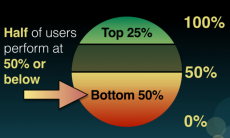I read an interesting post from Bill McCloskey on the need for specialization. Bill has a point, but I think there’s a counterpoint, too, when specialization gets out of control.
Bill makes the case for specialization in a straightforward way: “I submit that the über marketer who is expert in all the various forms of interactive marketing is someone who just doesn’t exist, or is very bad at a lot of things. An interactive jack of all trades, master of none, is not the person you want heading up your email marketing efforts.”
That sounds good, but I don’t agree. First, it presupposes that your marketing campaigns are big enough for all of these specialists. It might be good advice for Procter & Gamble but I don’t think it’s good advice for Procter Plumbing & Heating. Generalists are the only game in town for most businesses and they do a good job.
But I wonder if it is good advice even for large businesses. As someone who’s spent a lot of time inside IBM’s marketing apparatus, I always found specialization to be a necessary evil. Yes, you absolutely need specialists for that deep information that gives your business an edge, but the more they retreat into their professional disciplines, the more prone they are to a special brand of myopia that I have christened “Specialist Disease.”
Specialist Disease can be cured, but prevention is easier as you might suspect. I understand where Bill is coming from because marketing, like every other discipline, naturally specializes as it matures. But we all must do more to convey that every professional must put the customer and the company before professional allegiances. For every time that fighting the professional battle for a best practice was the right thing to do, I’ve seen ten times where it wasn’t—just because a specialist did not look at the bigger picture and failed to accord respect to other specialties that were more important in that situation.
I’ve done it, too.
Back in 2001, I remember being appalled at IBM’s search marketing failure—I vowed to turn it around. So I, all full of myself as an expert, walked in to tell the IBM Webmasters how they should be doing their jobs. I told them how they needed to change their domain names and host country sites on local servers and all sorts of other wonderful best practices. To their credit, they listened and adopted many of my suggestions, but not those two.
It would have been horribly expensive to revamp domain names and scuttle the multi-country server hosting system. And it would have been bad for customers to deal with millions of redirected pages. So the Webmasters pushed back. I worked them far too hard before I backed down because I “knew” that I was right.
Well, it turned out the Webmasters were right. IBM has increased its search traffiic 25 times since that day, all without doing either of those things I suggested. I am happy that people took my advice in many other areas, but the Webmasters were right to ignore those two gems. We didn’t need to do either one.
I learned a valuable lesson about how specialists think and ever since I have tried to have a more general, balanced outlook so that we make decisions faster with less contention. And I don’t think that approach has dimmed my expertise any—I think being practical is the right way to deliver the most value with your expertise.
Bill actually seems to favor a contention system between multiple specialists to get the best result: “What you want is someone who is corralling those passionate about search, RSS, email, banners, rich media, mobile marketing, WOMM, social networks, viral into a room and figuring out an integrated strategy that makes sense.”
I think that can work, but better than cross-functional teams are cross-functional people. Contention systems are SLOOOW. And what we need these days is more quick decisions and less arguing to achieve the dreaded consensus. Specialist Disease puts a real crimp in your pace. I’d rather do it wrong quickly and then fix it. Instead of letting the specialists argue, let the customer decide.



